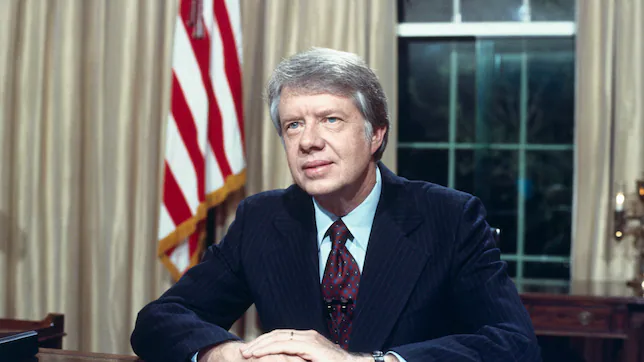The 39th President of the United States, Jimmy Carter, passed away at the age of 100 after nearly two years in hospice care.
On the afternoon of 18 February 2023, the Carter Center announced that the former president would return home to receive hospice care after a short hospital stay. Over a year later, the family has confirmed that the health of the 39th President of the United States has taken another turn for the worse and that he is surrounded by those he loves.
https://t.co/1auzIG0yqy pic.twitter.com/JJQMWgg8DW
— The Carter Center (@CarterCenter) February 18, 2023
Jimmy Carter, the 39th President of the United States, was one-hundred years old when he passed away 29 December, 2024
An immediate cause has not been given by his family, but this will be updated when its announced.
The longest-living president
President Carter was the longest-living president in US history, topping the record set by George HW Bush, who died at ninety-four in 2018. He leaves behind the four children he shared with his late wife Rosalynn, Jack, James III, Donnel, and Amy, along with their twelve grandchildren and thirteen great-grandchildren.
The first president to attend the US Naval Academy, Carter served in the Navy from 1946 to 1953.
View this post on Instagram
After leaving the military and struggling to keep his late father’s peanut farm open, Jimmy Carter began his political career.
In 1963, he was elected to the George State Senate, where he served until being elected governor in 1970. Just five years later, Carter was elected the 39th President of the United States, where he would serve one term after losing to Ronald Regan in 1980. Nevertheless, his four years in the White House shaped the modern era we find ourselves in.
The policy achievements of the Carter administration are defined by the era: globalization is taking shape, the Chicago School of Economics has a growing audience in Washington, and internationally, the politics of the Cold War are starting to catch up with the national security apparatus. Carter oversaw the economic transition from the post-war Keynesian approach to the globalized and highly financialised system we live under today. His administration contributed to this process by overseeing a massive wave of deregulation in critical industries. These deregulatory trends continued under President Regan and the Democratic administration that followed as well. Under President Clinton, Congress repealed the Glass–Steagall Act, laying the groundwork for the 2008 Financial Crisis.
President Carter’s legacy after his departure from Washington DC
For President Carter, the decades since leaving office have been defined by the achievements of the Carter Center. The Carter Center was founded by Jimmy and Rosalynn shortly after they departed Washington. The former president received the Nobel Peace Prize in 2002 for the work done by the organization.
One of the Carter Center’s most notable accomplishments is its effort to nearly eradicate Guinea worm disease. When the couple set the goal of eradication in 1986, more than 3.5 million cases were reported annually. In 2022, the total number of cases did not surpass thirteen.
As with any president, the legacy of Jimmy Carter will be tied to his short time in Washington. But for many, the historical memory of President Carter will be strongly influenced by his service after he left office.


